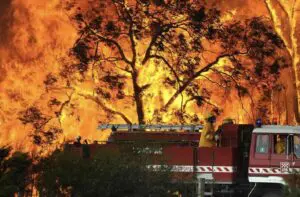As Australia’s natural gas sector braces for the price impact of the global Covid-19 crisis, a leading energy think tank has used new analysis to argue that emissions from natural gas have been dangerously underestimated and that it was wrong to treat gas as a “transition fuel” in the shift away from coal.
In a new report, the Institute for Energy Economics and Financial Analysis (IEEFA) says that emissions from the production and use of natural gas may have been significantly underestimated and that this has been obfuscated by a concerted campaign of the natural gas industry.
“The industry claims burning fossil fuels such as ‘natural’ gas is cleaner than burning coal, a commodity on its way out as the world transitions to cleaner more sustainable energy sources,” IEEFA gas analyst Bruce Robertson said.
“This is simply not the case. Gas is worse than coal in the short term due to its release of methane into the atmosphere.”
IEEFA criticised the continued efforts to position natural gas as a transition fuel and suggestions that the global economy should use gas as an alternative to coal, rather than simply transitioning directly to affordable supplies of zero-emissions energy.
“Methane from gas poses the greatest threat to the warming climate,” Robertson said. “If you leak more than 2% to 3% of methane, it is worse for the climate than coal.”
Australia has significantly increased its production of natural gas over the last decade, with the growth in supply almost exclusively being directed into the export market, in search of lucrative prices being offered by industrial customers in South Korea and Japan.
This ramp-up in new gas production has pushed Australian greenhouse gas emissions higher, with subsequent increases in fugitive emissions effectively offsetting emissions reductions achieved in the electricity sector.
Natural gas predominantly consists of methane gas, which is a potent greenhouse gas and has a warming potential that is 28 times greater than carbon dioxide over a 100-year period. It is even more potent over shorter timeframes.
Federal energy and emissions reduction minister Angus Taylor has repeatedly said that while Australia’s own emissions are increasing, the production of gas for the export market is reducing the world’s overall greenhouse gas emissions by lowering them in other countries.
This is an assertion that has been questioned by many researchers, who have argued that Australia’s gas exports more likely work to increase overall fossil fuel use, and therefore increase global greenhouse gas emissions, rather than being used as an alternative to coal.
The IEEFA analysis also puts Taylor’s claim into doubt given the amount of gas lost in the production of liquified natural gas, as well as the emissions associated with the transport and use of the gas itself.
The Federal government recently secured an agreement with the New South Wales state government to increase the supply of gas in that state, including the development of potentially uneconomic gas reserves in the Narrabri region.
“The government says gas is a transition fuel,” says Robertson.
“Instead, this long list of hugely expensive infrastructure projects shows the gas industry is using the transition narrative to embed itself into the energy future of Australia in the long term, crowding out other sources of power, while lying about the effects of its product on climate change, and therefore people’s day-to-day lives.”
IEFFA compared the potential discrepancy in emissions caused by natural gas to that of Volkswagen and the fallout from the “Dieselgate” saga when it was revealed the German auto manufacturer had been systematically cheating vehicle emissions tests.
IEEFA argued that there was a growing appreciation of the climate impacts of increased use of natural gas and that the sector could experience a similar reckoning to that of Volkswagen.
“Not only is this a massive stranded asset risk we will all have to carry, the industry’s deception is carrying its investors and shareholders, and banks and insurers into a dark place.”
“Volkswagen’s lies have cost it dearly. The gas industry must also be exposed.”
The analysis from IEEFA mirrors the findings of research published in the journal Nature that found that human-caused methane emissions had been systematically underestimated and that they may be up to 40 per cent higher than first thought.
In that research, an international team of climate scientists found that the level of historical levels of methane released into the atmosphere as a result of fossil fuel extraction had been underestimated and that human activity, rather than biogenic sources of methane, had was responsible for a larger contribution to global warming.
The analysis also follows the release of Hugh Saddler’s latest National Energy Emissions Audit, published by The Australia Insitute late last month, which found Australia’s gas power fleet to be inefficient and costly.
Saddler found that the combined-cycle gas plants in Australia’s national electricity market ran at just 30 per cent capacity across the past 18 months.
“In reality, gas is expensive, it’s high-polluting and, as this research shows, it is underperforming,” said TAI’s Richie Merzian in comments to The Guardian. “Given this, why would we underwrite new gas-fired plants?”








